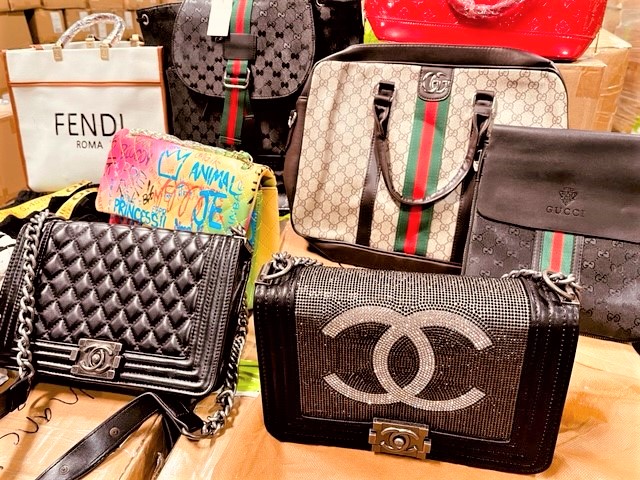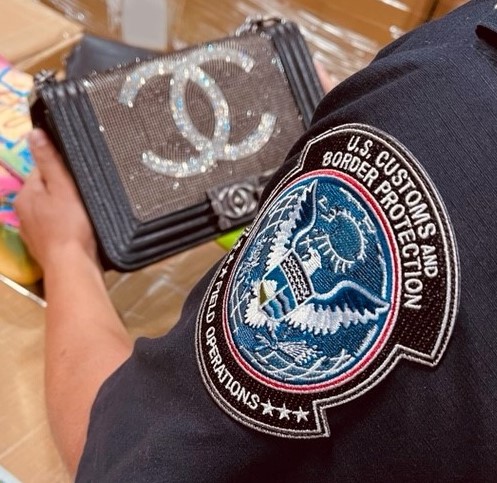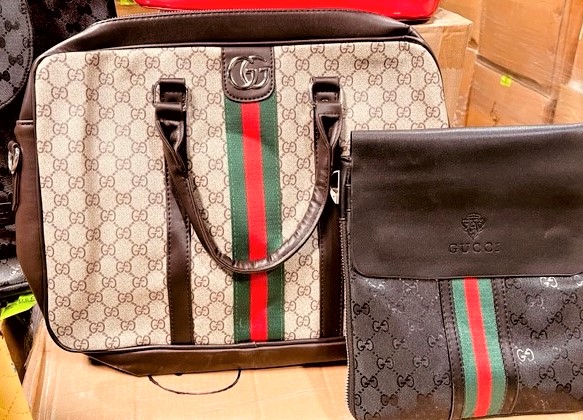Los Angeles, California - U.S. Customs and Border Protection (CBP) officers assigned to the Los Angeles/Long Beach Seaport in coordination with Import Specialists from the Consumer Products and Mass Merchandising (CPMM) Center of Excellence and Expertise intercepted 13,586 counterfeit designer products arriving in a containerized cargo shipment from China.
CBP officers discovered handbags, tote bags, shoulder bags, crossbody bags, backpacks, shirts, and pants bearing numerous registered and recorded trademarks, such as Gucci, Chanel, Fendi, YSL and Louis Vuitton.
CBP officers, in cooperation with U.S. Homeland Security Investigations (HSI) Special Agents seized the shipment on November 9, 2021. If genuine, the seized merchandise would have a combined estimated Manufacturer’s Suggested Retail Price (MSRP) of $30,437,775.

shoulder bags, crossbody bags, backpacks, shirts, and
pants bearing numerous registered trademarks.
“CBP commits substantial law enforcement resources to keep counterfeit and pirated goods out of U.S. supply chains, markets, and streets,” said Carlos C. Martel, Director of Field Operations in Los Angeles. “Now more than ever, CBP officers remain vigilant, committed, and focused on disrupting these smuggling operations.”
Historically, counterfeit products have been sold on illegitimate websites and in underground outlets. The rise of e-commerce offers a haven for criminals who are now able to hide behind seemingly legitimate listings on well-known websites. The sale of counterfeit commodities multiplies the illegal profits of smugglers and traffickers who reinvest the proceeds from such sales into further criminal enterprises.

often of inferior quality and may feature poor or
uneven stitching, fragile fabrics, and improperly
sized or designed logos.
“Bad actors exploit e-commerce operations by selling counterfeit and unsafe goods through online platforms, particularly during the holiday season when shoppers are looking for deals,” said Donald R. Kusser, Port Director of the Los Angeles/Long Beach Seaport. “If the price of the product seems too good to be true, it probably is. Counterfeit goods are often of poor quality and can even be unsafe for you and your family.”
Consumers can take simple steps to protect themselves and their families from counterfeit goods:
- Purchase goods directly from the trademark holder or from authorized retailers.
- When shopping online, read seller reviews and check for a working U.S. phone number and address that can be used to contact the seller.
- Review CBP’s E-Commerce Counterfeit Awareness Guide for Consumers.
- Remember that if the price of a product seems too good to be true, it probably is.
Counterfeit apparel, footwear, and handbags are often of inferior quality and may feature poor or uneven stitching, fragile fabrics, and improperly sized or designed logos. Peeling labels, low-quality ink or printing errors on the packaging are also signs that products may not be legitimate.

criminals who are now able to hide behind
seemingly legitimate listings on
well-known websites.
Trade in counterfeit and pirated goods threatens America’s innovation economy, the competitiveness of businesses, and, in some cases, national security and the health and safety of consumers.
To deter the importation of illicit goods and protect U.S. consumers and businesses, CBP has developed a proactive, aggressive and dynamic enforcement approach to Intellectual Property Right (IPR) enforcement.
In Fiscal Year 2020, CBP personnel nationwide seized 26,503 shipments containing counterfeit goods estimated to be worth nearly $1.3 billion had they been genuine.
